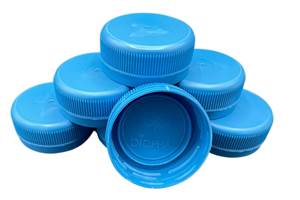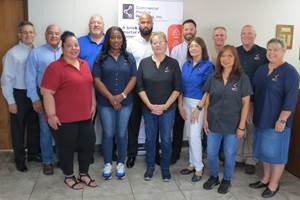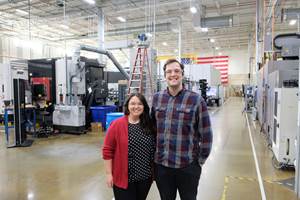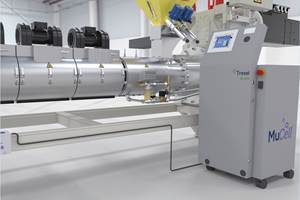Sustainability Is Not a Buzzword For Thin-Gauge Thermoformer
At a time when many processors either pay lip service to environmental concerns or hope the “greenwashing” zealots will grow weary and turn their attention elsewhere, Dordan Manufacturing Co. Inc. leaves no stone unturned in an effort to get the truth out about plastics and the environment.
When it comes to sustainability, Dordan Manufacturing Co. Inc. not only talks the talk, but it walks the walk. And it blogs and tweets, too. At a time when many processors large and small either pay lip service to environmental concerns or hope the “greenwashing” zealots will grow weary and turn their attention elsewhere, this family-owned, midsized, thin-gauge thermoformer (dordan.com) leaves no stone unturned in an effort to get the truth out about plastics and the environment.
Based in Woodstock, Ill., Dordan’s primary business is manufacturing custom-designed clamshells, blisters, trays, and components for a variety of industries. Founded in 1961 by Edwin Slavin, the company now employs about 100 and is owned and run by second- and third-generation family members.
Dordan’s commitment to sustainability is no pet project. Since 1996, when Dordan began developing expertise in thermoforming recycled PET (RPET), it has been using a four-step Design for Sustainability process that helps customers achieve measurable sustainability improvements. This process allows for informed material selection and reduction, resulting in a lower package carbon footprint, which is documented via Dordan’s subscription to the Sustainable Packaging Coalition’s Comparative Packaging life-cycle assessment (LCA) modeling software, called COMPASS.
More recently, Dordan has been on the leading edge of using social media, technical conferences, packaging trade shows, and every other outlet at its disposal to disseminate research on plastics packaging aimed at countering the “bad science” that most processors and suppliers feel is rampant.
Quite a few of these efforts have been spearheaded by Chandler Slavin, who joined the company after graduating summa cum laude with a degree in ethics and social justice from DePaul University in 2009 and who now serves Dordan in the dual role of marketing director and sustainability coordinator. Her mission is to uncover the truth about plastics packaging and the environment.
She has enthusiastically driven Dordan’s social media efforts, writing the company’s sustainability weblog at recyclablepackaging.org. She aims to dispel consumer misconceptions about plastics and the environment by utilizing publicly available research and LCA databases. Topics covered thus far in her research include: The Truth about Clamshell and Blister Recycling in America, for which Dordan has received a copyright; Bio-based Resin Report; Extended Producer Responsibility Report; and more.
Ultimately, Dordan wants to help develop a recycling infrastructure for PET thermoformed products akin to what’s in place for PET bottles. Ms. Slavin states, “The solution is to identify and resolve obstacles that have prevented thermoformed containers from being recycled. The reason thermoformed packaging is not recycled is because of good old economics of supply and demand, sprinkled with the need for technology and investment.”
Dordan is taking steps to get its own environmental house in order. CEO Daniel Slavin has announced a zero-waste sustainability project whose goal is to divert all of Dordan’s waste from landfill. Dordan has also arranged for a local farmer to use company land this spring for an organic garden to produce foodstuffs for Woodstock residents who prefer locally sourced to mass-produced goods.
Chandler Slavin notes that recycling thermoformed parts will always be Dordan’s goal. She is working with the Environmental Task Force of Dordan’s local school district on a presentation about recycling. “The best way to increase recovery rates for post-consumer materials is education,” she says.
Related Content
PHA Compound Molded into “World’s First” Biodegradable Bottle Closures
Beyond Plastic and partners have created a certified biodegradable PHA compound that can be injection molded into 38-mm closures in a sub 6-second cycle from a multicavity hot runner tool.
Read MoreInside the Florida Recycler Taking on NPE’s 100% Scrap Reuse Goal
Hundreds of tons of demonstration products will be created this week. Commercial Plastics Recycling is striving to recycle ALL of it.
Read MoreScaling Up Sustainable Solutions for Fiber Reinforced Composite Materials
Oak Ridge National Laboratory's Sustainable Manufacturing Technologies Group helps industrial partners tackle the sustainability challenges presented by fiber-reinforced composite materials.
Read MoreFoam-Core Multilayer Blow Molding: How It’s Done
Learn here how to take advantage of new lightweighting and recycle utilization opportunities in consumer packaging, thanks to a collaboration of leaders in microcellular foaming and multilayer head design.
Read MoreRead Next
Lead the Conversation, Change the Conversation
Coverage of single-use plastics can be both misleading and demoralizing. Here are 10 tips for changing the perception of the plastics industry at your company and in your community.
Read MoreBeyond Prototypes: 8 Ways the Plastics Industry Is Using 3D Printing
Plastics processors are finding applications for 3D printing around the plant and across the supply chain. Here are 8 examples to look for at NPE2024.
Read MoreSee Recyclers Close the Loop on Trade Show Production Scrap at NPE2024
A collaboration between show organizer PLASTICS, recycler CPR and size reduction experts WEIMA and Conair recovered and recycled all production scrap at NPE2024.
Read More















